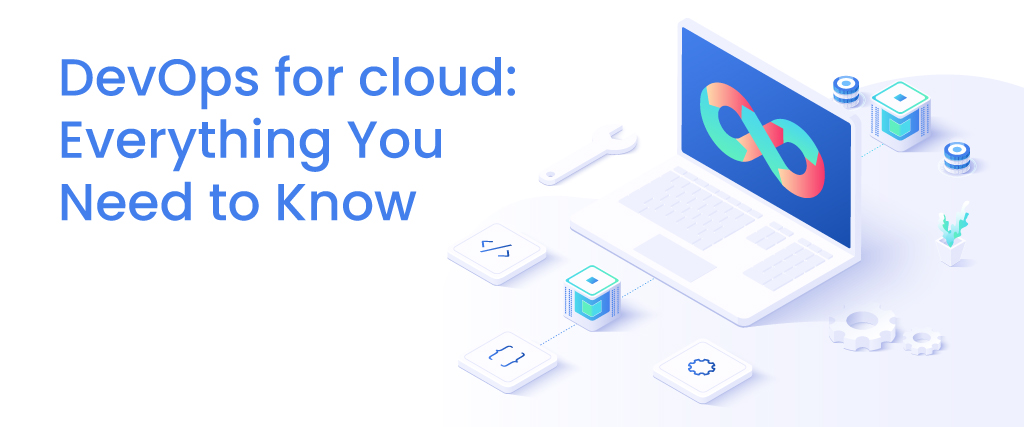DevOps for Cloud: Everything You Need to Know

There are a few crucial factors that significantly differentiate good-performing firms from low-performing ones. In the past few years, success for businesses has been determined by elements like frequent deployments, quick load times, accelerated recovery times, and decreased change failure rates. Startups have been filling this gap by spending on cloud architecture, but they have begun to see that it's time to move up the architectural style and look for a more robust and fail-fast alternative. DevOps for cloud is one of the solutions they are finding. Implementing DevOps would include merging the development and operations teams in a way that automates the agile process and gets rid of the delay associated with software development at its core. DevOps for cloud have naturally blended to form this development methodology, which is centered on speed and quality. One that is being adopted by both businesses and cloud service providers.
DevOps for cloud: An organic link
 The goal of using DevOps automation services, which have historically been marketed as cloud offerings, is to respond to business needs in semi-real time.
As a result, drawing comparisons between the two methods is very simple.
● The centralized cloud computing architecture provides DevOps automation with a consolidated and uniform platform for developing, testing, and deploying applications.
This, in the past (before cloud-based DevOps), experienced a lag since some enterprise software's dispersed mode didn't combine well with the need for centralized software deployment.
● DevOps is now generally supported by cloud computing providers, in addition to comprehensive continuous integration and ongoing development, on their platforms.
In addition to providing centralized governance over the procedure, this close integration lowers the cost of on-premises automation of DevOps cloud development.
● How cloud computing aids in the shift to DevOps depends on whether cloud platforms are accepted.
Having examined the natural relationship between DevOps and cloud computing, it is essential to understand what is driving this change in the software development industry and why businesses should change their priorities to deploy DevOps in the cloud.
The goal of using DevOps automation services, which have historically been marketed as cloud offerings, is to respond to business needs in semi-real time.
As a result, drawing comparisons between the two methods is very simple.
● The centralized cloud computing architecture provides DevOps automation with a consolidated and uniform platform for developing, testing, and deploying applications.
This, in the past (before cloud-based DevOps), experienced a lag since some enterprise software's dispersed mode didn't combine well with the need for centralized software deployment.
● DevOps is now generally supported by cloud computing providers, in addition to comprehensive continuous integration and ongoing development, on their platforms.
In addition to providing centralized governance over the procedure, this close integration lowers the cost of on-premises automation of DevOps cloud development.
● How cloud computing aids in the shift to DevOps depends on whether cloud platforms are accepted.
Having examined the natural relationship between DevOps and cloud computing, it is essential to understand what is driving this change in the software development industry and why businesses should change their priorities to deploy DevOps in the cloud.
What causes DevOps to be the new standard in cloud development?
DevOps is preferred by developers because it streamlines and expedites the development process. However, they are also aware that integrating merely DevOps (without using a cloud strategy) cannot be their whole solution because doing so necessitates spending money on gear and software, which forces engineers to delay deployment. DevOps and cloud deployment together offer several noteworthy advantages. ● Using the DevOps-based cloud model, a streamlined development process and access to real-time development environments reduce the time it takes for software to reach the market. ● DevOps for the cloud includes an infrastructure as code methodology that, when combined with automation technologies, reduces the complexity of the cloud and system maintenance. ● In the DevOps cloud platform, the automation of recurring processes eliminates the possibility of errors while constructing a strong security control architecture.What does the software development process involve for cloud DevOps services?
 Together, the cloud and DevOps are essential for defining how speed and productivity are defined in an organization.
How does it affect the process of developing software, though?
For starters, it aids in resolving the numerous speed and efficiency issues that come up while using a waterfall development strategy.
Together, the cloud and DevOps are essential for defining how speed and productivity are defined in an organization.
How does it affect the process of developing software, though?
For starters, it aids in resolving the numerous speed and efficiency issues that come up while using a waterfall development strategy.
